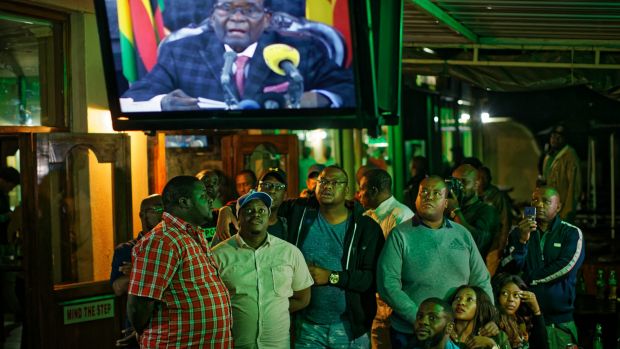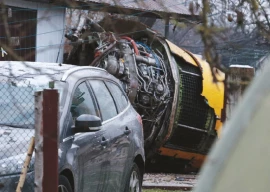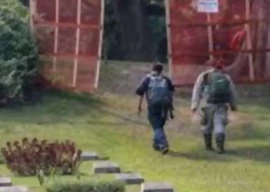
Impeachment could see Mugabe kicked out by a vote in parliament in under a day and would represent an ignominious end to the career of the "Grand Old Man" of African politics, who was once lauded across the continent as an anti-colonial hero.
Chief whip Lovemore Matuke told Reuters ZANU PF members of parliament would meet at 1230 GMT to start mapping out Mugabe's impeachment.
In the draft motion, the party accused Mugabe of being a "source of instability", flouting the rule of law and presiding over an "unprecedented economic tailspin" in the last 15 years.
President Mugabe stuns Zimbabwe by defying pressure to resign
It also said he had abrogated his constitutional mandate to his hot-headed and unpopular 52-year-old wife Grace, whose tilt at power triggered the backlash from the army that saw it put tanks on the streets of the capital last week.
On paper, the process is relatively long-winded, involving a joint sitting of the Senate and National Assembly, then a nine-member committee of senators, then another joint sitting to confirm his dismissal with a two-thirds majority.
However, constitutional experts said ZANU-PF had the numbers and could push it through in as little as 24 hours.
"They can fast-track it. It can be done in a matter of a day," said John Makamure, executive director of the Southern African Parliamentary Support Trust, an NGO that works with the parliament in Harare.
Zimbabwe's ruling party sacks Robert Mugabe
Mugabe's demise, now almost inevitable, is likely to send shockwaves across Africa, where a number of entrenched strongmen from Uganda's Yoweri Museveni to Democratic Republic of Congo's Joseph Kabila are facing mounting pressure to step aside.
Mugabe was once admired, even in the West, as the "Thinking Man's Guerrilla", a world away from his image in his latter years as the stereotypical African dictator proudly declaring he held a "degree in violence".
As the economy crumbled and opposition to his rule grew in the late 1990s, Mugabe tightened his grip around the southern African country, seizing white-owned farms, unleashing security forces to crush dissent and speaking of ruling until he was 100.
Sanitised coup
ZANU-PF's action follows a weekend of high drama in Harare that culminated in reports Mugabe had agreed to stand down - only for him to dash the hopes of millions of his countrymen in a bizarre and rambling national address on Sunday night.
Flanked by the generals who sent in troops last week to seize the state broadcaster, Mugabe spoke of the need for national unity and farming reform, but made no mention of his fate, leaving the nation of 16 million people dumbstruck.
"I am baffled. It's not just me, it's the whole nation," shocked opposition leader Morgan Tsvangirai told Reuters. "He's playing a game."
Two senior government sources told Reuters Mugabe had agreed on Sunday to step aside and CNN said on Monday his resignation letter had been drawn up, with terms that included immunity for him and Grace.
Zimbabwe's ruling party set to sack Mugabe
Two other political sources told Reuters on Monday Mugabe had indeed agreed to resign but ZANU-PF did not want him to quit in front of the military, an act that would have made its mid-week intervention look like a coup.
"It would have looked extremely bad if he had resigned in front of those generals. It would have created a huge amount of mess," one senior source within ZANU-PF said.
Another political source said the speech was meant to "sanitise" the military's action, which has paved the way for Mnangagwa, a former security chief known as The Crocodile, to take over.
Moments after his address, war veterans' leader Chris Mutsvangwa, who has spearheaded an 18 month campaign to unseat Zimbabwe's only leader, called for protests suggesting a potential popular uprising if Mugabe refused to go.
In London, a spokesperson for British Prime Minister Theresa May said Mugabe had clearly lost the support of his people.
Since last week, Mugabe has been confined to his lavish "Blue Roof" residence in Harare, apart from two trips to State House to meet the generals and one to a university graduation ceremony at which he appeared to fall asleep.
Grace and at least two senior members of her 'G40' political faction are believed to be holed up in the same compound.
Deep state
On Saturday, hundreds of thousands took to the streets of Harare to celebrate Mugabe's expected downfall and hail a new era for their country, whose economy has imploded under the weight of economic mismangement, including 500 billion percent hyperinflation in 2008.
An estimated 3 million Zimbabweans emigrated to neighbouring South Africa in search of a better life. The huge crowds have given a quasi-democratic veneer to the army’s intervention, backing its assertion that it was merely effecting a constitutional transfer of power, rather than an old-style coup, which would risk a diplomatic backlash.
Behind the euphoria, however, some Zimbabweans have misgivings, not least because of the prominent role played by the military in removing Mugabe.
Stunned Zimbabweans face uncertain future without Mugabe
"The real danger of the current situation is that, having got their new preferred candidate into State House, the military will want to keep him or her there, no matter what the electorate wills," former education minister David Coltart said.
Others worry about Mnangagwa's past, particularly as state security chief in the early 1980s, when an estimated 20,000 people were killed in the so-called Gukurahundi crackdown by the North Korean trained Fifth Brigade in Matabeleland.
He has denied any wrong-doing but critics say Zimbabwe risks swapping one army-backed autocrat for another. "The deep state that engineered this change of leadership will remain, thwarting any real democratic reform," said Miles Tendi, a Zimbabwean academic at Oxford University.



1732623521-0/bitcoin-(1)1732623521-0-165x106.webp)

1732618327-2/Untitled-design-(7)1732618327-2-270x192.webp)











COMMENTS
Comments are moderated and generally will be posted if they are on-topic and not abusive.
For more information, please see our Comments FAQ